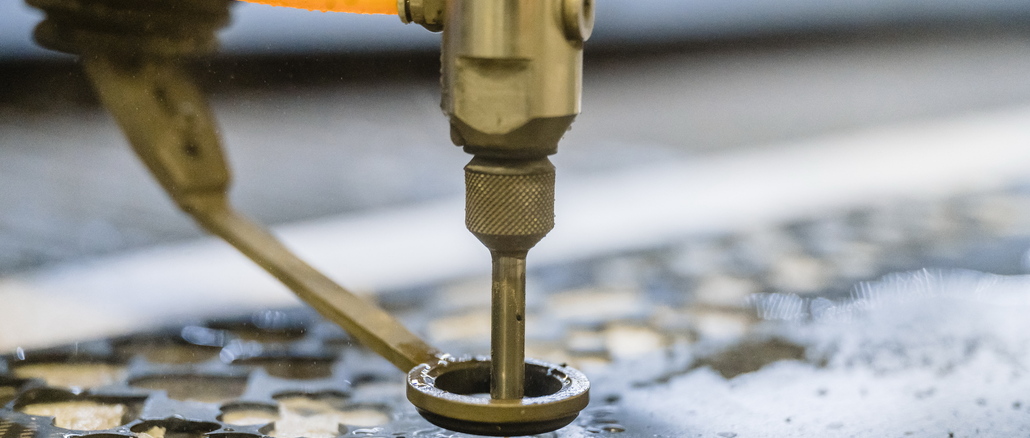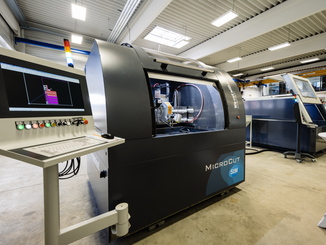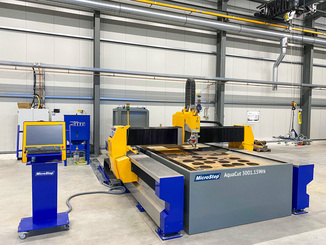
Fiber composites, whether based on carbon, glass, aramid or natural fibers, are enjoying growing popularity thanks to their malleability, corrosion resistance, stability and lightness. But the processing is anything but simple. This already starts with the cutting of the fabrics.
Especially in lightweight construction and aerospace, production must be adapted to the properties of the composite materials. This fuels the need for gentle and universal cutting processes, as composites fray easily and their mechanical material properties such as heat resistance, radiation absorption or fire resistance can be easily compromised during cutting. In addition, the dust produced during machining must be discharged, as it is harmful to health and, as an electrical conductor, can also damage the machinery. At the same time, maximum precision and flexibility are required for machining. These high demands put a cutting process in the spotlight: waterjet cutting.
This is because the cold cutting process enables extremely gentle working and cuts even the finest and highly complex structures precisely, reproducibly and practically fully automatically with a tolerance of up to ± 0.1 millimetres. Thanks to the very thin cutting gap of 0.31 millimeters, this technology not only cuts quickly and cost-effectively, but also material-efficiently and with minimal tool wear. Reworking of fraying and the like is not necessary. Likewise, in contrast to thermal cutting techniques, there is no hardening or tension in the workpiece during the cutting process, nor is there any health-endangering vapour, dust or smoke, as cutting can also be carried out under water.
All in all, almost all conventional composite materials can be processed with the waterjet in an environmentally friendly and cost-effective manner. What’s more: unlike milling, almost all other materials can also be cut on the same machine without any major retooling effort. Last-not-least, the water used can be treated and reused. The waterjet cutting systems from STM also meet these requirements.
With its modular plant system, the Austrian waterjet pioneer has specialised in tailor-made complete solutions and offers interested companies a full service that has been perfected down to the last detail. The range of services extends from consulting and test sections, training, service and maintenance to the comprehensive supply of wear parts and operating materials and financing management. With this all-round support, STM offers companies an opportunity to switch to a new, more efficient technology.
Water jet technology to grow with
STM’s waterjet system can efficiently separate composites. The modular waterjet cutting system from STM can be individually adapted to current requirements. Even with inexpensive entry-level models such as the STM EcoCut, any composite material can in principle be cut with clean water or the addition of abrasive sand on one and the same machine without any conversion effort. The pressure can be continuously adjusted to the material properties: In the case of soft composites, the working pressure is reduced to 600 bar when drilling, while hard materials are processed at pressures of up to 4,000 bar. In the high-pressure pump, functions such as frequency converter and smooth running ensure energy and cost efficiency and environmentally friendly operation. Programming cutting tasks takes just a few minutes with the intuitive STM SmartCut software. Drawn workpieces are read in by the software and nested in the best possible way for larger batches. From this point on, a fully automated cutting process starts.
Possible additional plant equipment such as a pneumatic drilling spindle for tapping sensitive materials or the modular water treatment system OneClean are optionally available for all plants and can also be retrofitted later at any time.
In short: companies can grow with new tasks without friction losses, as the modular system from STM offers a practicable solution for almost every cutting challenge. The possibilities go far beyond the processing of composites and include materials such as steel, aluminium, metal, stone, ceramics, plastics and glass.
Universal possibilities, manageable investment
The all-rounder among the STM systems is the PremiumCut, which offers unlimited cutting options thanks to its full equipment. Companies that mainly cut 2D workpieces are equipped with an EcoCut for the production of smaller series.
At full capacity, the acquisition costs can be amortized after only a few years. In addition, STM’s “everything from a single source” promise ensures cost-effective operation: STM specialists ensure the best possible use of STM technology by advising customers on site and providing personal support from training through installation and ongoing operation to maintenance and the procurement of wear parts and operating materials.
This applies not least to support in applying for subsidies, because investment in waterjet is subsidised by the state – in Germany until 2023, in Austria until April 2021.
Entry into waterjet cutting made easy
Interested parties can test the performance of STM systems on the basis of an individual test cut or at any time in the STM test centres in Germany, Austria or Switzerland without obligation. On request, interested parties can receive a free system proposal, including a cost-benefit analysis, in order to be able to precisely evaluate the suitability of a waterjet cutting system according to their needs. Used systems and financing models make an acquisition possible even with limited financial leeway.




